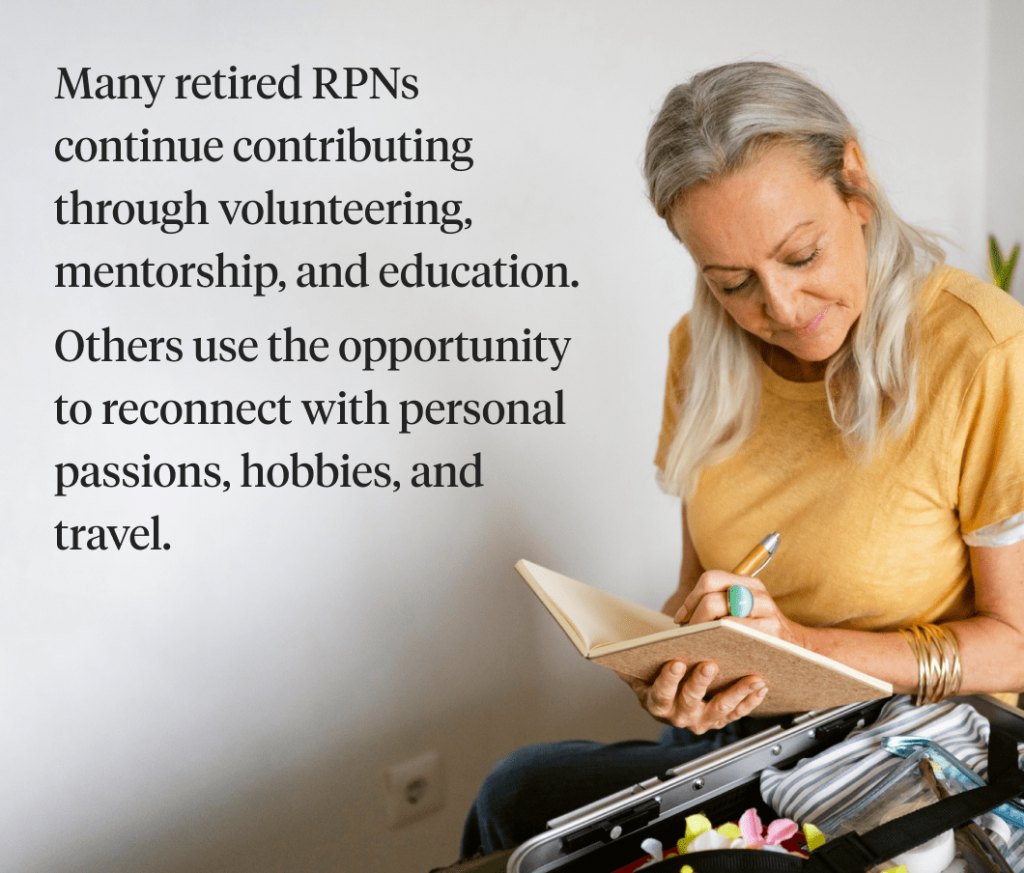

Retirement is a major milestone, but for many RPNs, it raises questions about financial security, emotional readiness, and life after nursing. While some eagerly anticipate their next chapter, others feel uncertain about when and how to retire.
Betty Fehr, RPN, retired in September 2024 after an exemplary career in Home and Community Care (HCC) with SE Health. She spent 12 years as a personal support supervisor before transitioning to teaching at the SE Career College of Health. Eventually, she began managing the College’s instructors and her coworkers — people she was reluctant to leave.
“Losing your work family is a more difficult transition [than retirement itself],” says Betty.
When is the right time to retire?
There is no universal retirement age, but many RPNs retire between 60 and 70. Financial considerations (including savings, pensions, and cost of living) are an essential part of retirement planning, so it’s wise to start early in your career. Other factors influencing timing include:
Physical and mental health
Workplace demands can become challenging with age.
Career satisfaction
Some nurses work longer due to passion for their job, while others may feel burnt out and ready for change.
Betty knew she was ready to retire when she realized she was getting tired and had accomplished everything she set out to do. The completion of two major projects marked a turning point, as did her confidence in leaving behind a strong, capable team.
“Give yourself time,” she advises. “Make a decision, and if you have to prolong it to complete [a project, for example,] that’s okay.”
It’s also recommended that retiring nurses keep their registration current for up to three years following retirement before moving to the “non practicing” category or giving up their registration altogether.


Staying active and engaged post-retirement
Retirement doesn’t mean the end of an impactful career. Many retired RPNs continue contributing through volunteering, mentorship, and education. Others use the opportunity to reconnect with personal passions, hobbies, and travel.
To ease into retirement, Betty joined a coffee club before leaving work, giving herself time to adjust. She attended her first in-person “Coffee Day” on the day she retired and now meets with the group every Thursday. Through this club, she made new friends and discovered additional activities, such as an exercise group she joins twice a week and weekly trivia nights at Boston Pizza.
Spending time with family has also become a priority. Betty and her husband love attending their grandchildren’s hockey games, especially since two of them live just across the street. She also volunteers with her church and is considering mentoring new nurses in the future. On quieter days, she indulges in one of her favourite pastimes – speed reading, often finishing at least one book per day while curled up in her recliner.
Emotional preparation
Beyond finances, adjusting to retirement can be an emotional journey. Nurses who have dedicated their lives to caring for others may struggle with a shift in identity. Staying connected to former colleagues, joining social groups, and setting personal goals can help ease the transition.
Betty recommends taking a vacation before officially retiring to get accustomed to the change. She spent four weeks in her hometown of Saskatchewan, enjoying time with family and friends.
Whether retirement is years away or just around the corner, proactive planning can make the process smoother and more fulfilling. By taking strategic steps now, RPNs can ensure a retirement that is both financially secure and personally rewarding.
“When we were working, we knew we needed to show up and do our best job every day, and I think we need to carry that into our retirement,” says Betty. “Instead of work, now we need to show up for ourselves and our community and continue to give our best.”